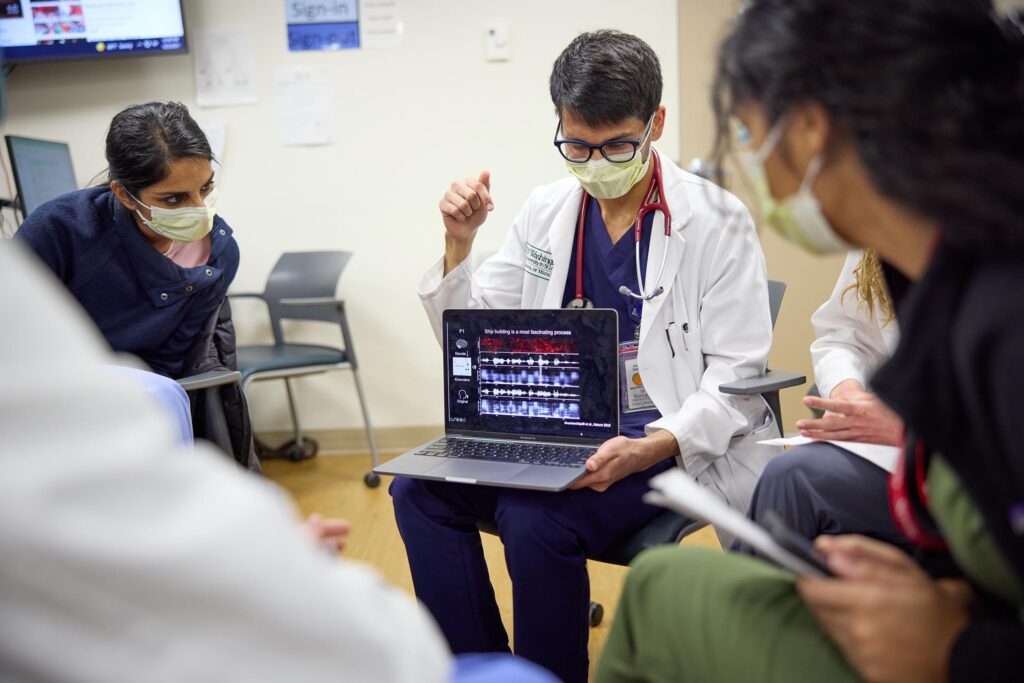
Program structure
The Roy Vagelos MSTP combines elements of the MD and PhD curricula for an individualized learning experience, with an emphasis on clinical experiences from the very beginning. On average, students complete the dual MD/PhD program in eight years, with learning occurring in four phases. Throughout all years, you’ll build camaraderie with fellow students through the annual spring retreat, journal clubs, DBBS seminars, the MSTP weekly meeting, winter dinner, summer social and the yearly class function.

You’ll jumpstart your time as an MSTP student with one required research rotation in July of your first year. You’ll then begin the Roy Vagelos MSTP Thread — a weekly course designed to develop your scientific mind by exploring the concept of “How do we know what we know?”
Phase One of the MD curriculum then officially begins with a 1-week orientation period called Gateway to the Curriculum. It continues with seven Foundational Science Modules of various lengths incorporating the basic sciences, clinical skills, and Physicians, Patients, and Systems and Society content. During three 3-week Clinical Immersions, you’ll rotate through three clinical environments: Inpatient, Outpatient (including urgent/emergent care) and Perioperative/Periprocedural/Procedural (including Labor & Delivery). Following the clinical immersions, you’ll complete your second required laboratory rotation (at least four weeks in length). Phase One ends with a 2-week Capstone course to solidify and consolidate your knowledge and skills and to prepare for the United States Medical Licensing Examination (USMLE) Step 1 Exam.
Phase length: 62 weeks

Before beginning your PhD research, you may complete additional research rotations as needed and/or use up to four weeks of study/preparation time for the USMLE Step 1 Exam.
Graduate school coursework includes the core curriculum and electives chosen based on your PhD program selection and research interests. In your first year in the PhD program, you’ll complete core coursework, begin your thesis research, participate in a mentored teaching experience and take your qualifying examination. By Dec. 31 of your second PhD year, you’ll submit your thesis proposal. In the remaining time, you’ll continue your thesis research, meet with your thesis committee every six months, and participate in clinical mentorships and scientific meetings. At this stage, you may complete additional coursework for further specialization or certification. Finally, you’ll culminate your years in the lab with your thesis defense.
Phase length: 48 months

Phase Two consists of six 8-week core clinical clerkships. You’ll rotate through internal medicine, surgery, pediatrics, OB/GYN, neurology and psychiatry.
The components of the core include preparation, clinical immersion and consolidation. In preparation, each clerkship begins with 1-3 weeks of specialty-specific foundational science. During clinical immersion, you’ll join the patient care teams with more engagement in advanced clinical work than Phase One. Finally, during consolidation, each clerkship ends with a 1-week period for revisiting concepts, filling in knowledge gaps, and assessments, reflection, coaching and community (ARCC).
Phase length: 48 weeks

During Phase Three, schedules and activities are tailored to your individual passions and career aspirations. Roy Vagelos MSTP students must complete a 4-week Internal Medicine Subinternship and two 4-week Advanced Clinical Rotations (ACRs), which are subinternship-like experiences in areas you select. You’ll then complete 16 weeks of electives and a 4-week Gateway to Residency Course (a.k.a. Capstone). In this phase, you may also use up to four weeks of study/preparation time for the USMLE Step 2 Exam. Finally, you’ll celebrate your accomplishments on Match Day and at graduation.
Phase length: 32 weeks
About the Gateway Curriculum
Health is determined, in part, by where people live, work, learn and play. Physicians today must possess an active understanding of these health determinants and navigate complex health-care systems. The Gateway Curriculum prepares students by integrating critical dimensions of practice: basic science, clinical skills, health systems science, social and behavioral science, and professional identity formation.
Academic excellence:
- Scientific and clinical immersion all four years
- Competency-based curriculum & transparent assessment
- Emphasis on teaching quality, learning styles, technological enhancement
- Critical thinking, research & innovation
Individual development:
- Multiple career pathways: Physician-researcher, educator, innovator, advocate, global health
- Customized, flexible framework
- Coaching relationships, mentors
- Student health & wellness — prioritizing self-care
Social justice:
- Community engagement & service learning
- Health equity
- Diversity & inclusion